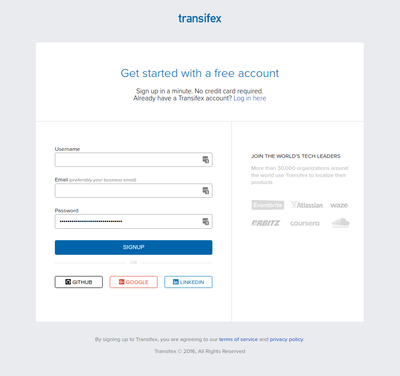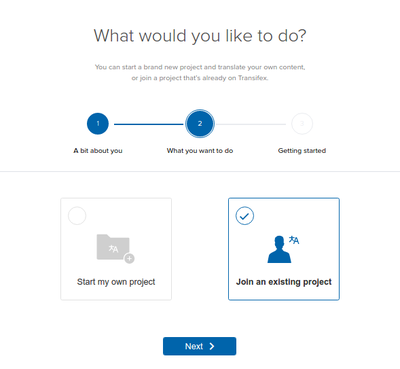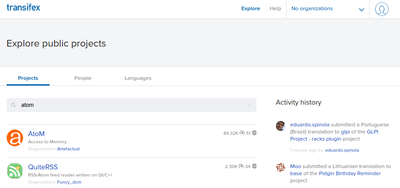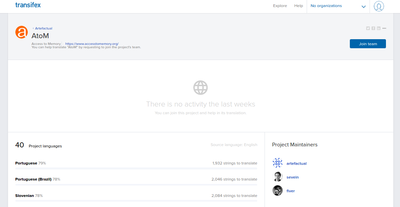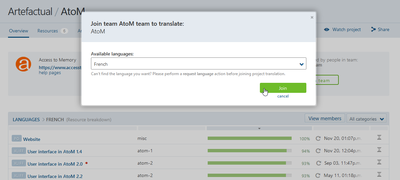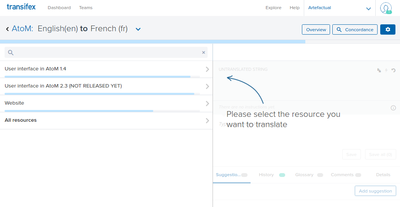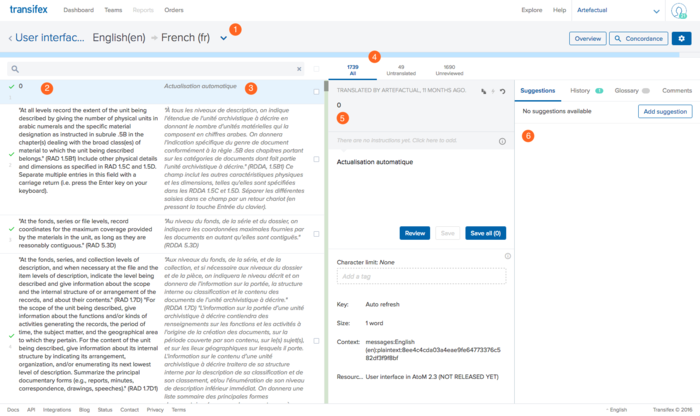Contribute translations
Main Page > Resources > Resources/Translation
Thank you for your interest in contributing user interface translations to the AtoM project! Your contributions help to make AtoM a multilingual application with a global reach.
In an effort to make the process of translating the AtoM interface more efficient, Artefactual Systems has started using Transifex, a web application to support dynamic publication of localization content from multiple sources. This means that more than one translator can contribute translated strings, making the process faster and easier, and enabling Artefactual Systems to publish translations more often. As well, everything is web-based using Transifex, meaning you can access your translation work via any web browser, instead of having to handle XLIFF files directly, as was the case with early versions of ICA-AtoM translations.
This page will introduce you to the AtoM Transifex project, so that you can sign up and begin contributing translations. When we package the next public release, we will include all translations submitted via Transifex in the release - so the entire community will benefit from your contributions.
Seealso
- Interested in contributing to our project documentation? We have a separate page for that! See: Contribute documentation
- Looking to contribute code to AtoM? See: Contribute code
- Check out our User Manual for information on how to translate content or interface elements locally (in your installation only) - see the Multilingual section.
You can see the AtoM project in Transifex here: https://www.transifex.com/projects/p/atom/
Contents
Sign up for an account with Transifex
1. Navigate to https://www.transifex.com/signup/
2. Fill in all the required fields, click on “Create my Account” (note: by doing so you are agreeing with the TransifexTerms of Use). If you have an existing Google, GitHub, or LinkedIn account, you can use this to create your Transifex account.
3. You'll be sent shown a confirmation message, informing you that an email to activate your account has been sent to the address you provided during registration.
When you've received the email, click on the link to activate your account and begin configuring your profile and preferences.
Seealso
Transifex has its own help documentation - here's a help page on getting started:
Join the AtoM Project
4. Once you have clicked on the activation link in your email, you will be redirected to a configuration page. Fill in your preferences.
5. At the bottom of the configuration page, you will see options to go to your dashboard, or to Find projects. Click the "Find projects" button.
6. Transifex will provide you with a list of current projects, and a search bar. Type "atom" into the search bar, and then click on the AtoM project when it appears below.
7. You will be redirected to the AtoM Transifex Project homepage.
Join a team
8. From the list of languages, select a language whose team you would like to join by clicking on the language name.
9. Transifex will show you a list of available resources (such as the AtoM website, and different major releases of AtoM). At the top of the page on the right-hand side, click the "Join team" button.
10. A pop-up will appear with a list of the available languages. Select your chosen translation language from the list. When you've found it, click the Submit button (if you wish to translate AtoM into multiple languages, you can repeat this process again later).
Important
Please review the options available in the list prior to requesting a new language! In many cases, we have had requests for different locales (for example, requesting "fr_FR" for France French, instead of working in the existing "fr" French project), but AtoM does not always support these very well. If at all possible, please work within the existing projects, or try to select the most generic option, without locale codes. We'll work with you if there are no other options, of course - but if you can avoid using a specific locale, it will make merging and maintaining your translations in AtoM much easier!
11. You will see a confirmation message in green at the top of the page, informing you that your request has been submitted. One of the Artefactual project maintainers will review the request and approve your account.
12. You will receive an automated email from Transifex introducing you to the translation editor interface and providing you with a link to generic help instructions. You may review these instructions if you wish, or follow the specific instructions that the AtoM coordinators have provided below.
Seealso
Here are the links that Transifex will provide you with in the email, for reference:
13. Once your account is approved by the AtoM coordinators, you will receive an email notification from Transifex. It will indicate that you have been accepted to the team of the language of your choice within the AtoM project. Once you've received this email, return to the AtoM Project homepage in Transifex (https://www.transifex.com/projects/p/atom/) and select your language from the list.
14. Transifex will show you a list of available resources (such as the AtoM website, and different major releases of AtoM) at the top of the page. Closed projects (for past releases or future releases for which we have not yet opened translation) will have a red dot next to them. Click on the version you wish to translate - for example, the most recent AtoM release that is open in Transifex.
15. A pop-up will appear with information about the current translated strings in that project for your chosen language. Click the "Translate" button to begin working via the web-based Translation Editor in Transifex.
Tip
Want to work translating multiple languages at once? Repeat steps 8-15 above. When you work with the Translation Editor, you will then be able to switch easily between languages.
Use the Translation Editor
You are now in the Editor screen. If you are a translator for more than one language/ team you can switch between the available languages using the "language drop-down menu" in the upper-right side of the screen. If you are only translating for one language, the dropdown will not be active.
Tip
Note that you can always get here from the Transifex AtoM project landing page: 1. Go to: https://www.transifex.com/projects/p/atom 2. Click the big "Translate" button 3. Choose the language you want to work in, and the resource (e.g. AtoM 2.1, AtoM 2.2, etc)
Here's what the Translation Editor interface looks like - we've added some numbered orange circles to the image to point out different parts of the interface, which will be explained below.
Seealso
Transifex documentation:
( 1 ) The language drop-down
This is where you can see what language you are currently working in. If you are working on translating AtoM into multiple languages (e.g. you have followed the steps above one time for each language, and have been added to the language teams), then you can also use this language drop-down to switch quickly between languages.


